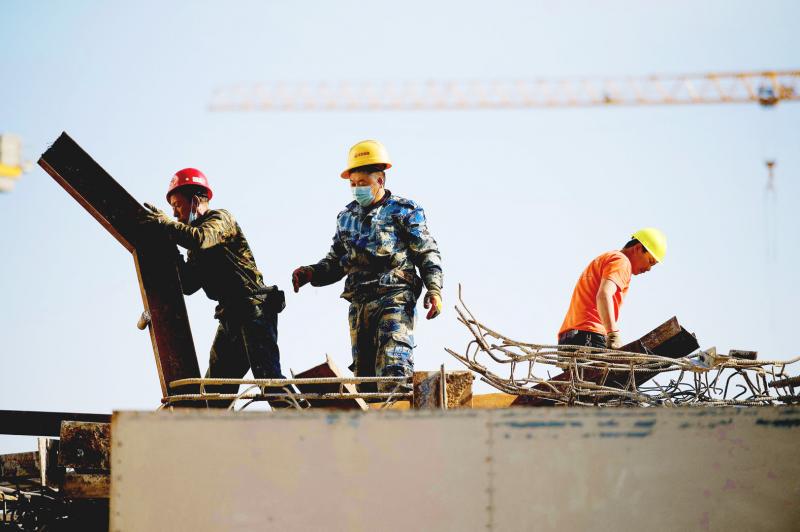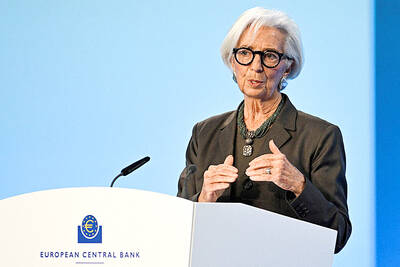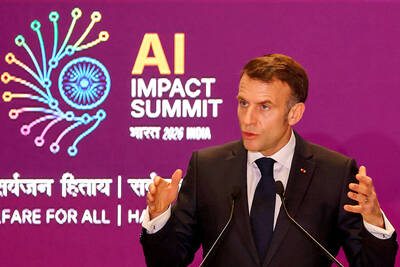Chinese President Xi Jinping (習近平) has called for an “all out” campaign to build infrastructure, Xinhua news agency reported, marking the latest attempt by leaders to boost growth in the economy battered by COVID-19.
Despite struggling to defeat the country’s worst outbreak in two years, the leadership is digging in its heels with a strict “zero COVID” policy that involves lockdowns in the biggest cities and mass testing.
However, the measures have snarled supply chains and hammered business morale, sending shock waves through the global economy and markets.

Photo: AFP
“Infrastructure is an important support for economic and social development,” Xi said at a high-level meeting on Tuesday, Xinhua reported.
China’s “infrastructure is still incompatible with the demand for national development and security,” the Chinese Central Committee for Financial and Economic Affairs said.
The meeting identified several sectors, such as transport and energy, where an infrastructure boost is needed, including the construction of ports and airports.
Lockdowns have clogged supply chains and transport networks, including in the economic dynamos of Shanghai and Shenzhen, as well as the northeastern grain basket of Jilin.
Xi’s comments are the latest in a series of statements and steps aimed at boosting confidence in the economy and reassuring markets, but traders have remained unmoved by the latest sweeping pledge, while a major spending push could also reignite debt worries.
After the 2008-2009 financial crisis, the Chinese government launched a stimulus package worth hundreds of billions of US dollars, including massive infrastructure investment, but that piled on the debt for local governments and state enterprises.
With risks to consumption and manufacturing exports, “initiatives to ramp up infrastructure spending are a direct policy tool to lift government spending,” said Rajiv Biswas, Asia-Pacific chief economist at S&P Global Market Intelligence.
However, infrastructure is “not a quick fix,” Nomura Holdings Inc chief China economist Ting Lu (陸挺) said.
“Lockdowns make the task of ramping up infrastructure investment more difficult due to ... travel bans and a shortage of construction workers in ... [the affected] areas,” he said.
It would also “be unrealistic to expect much faster infrastructure investment growth, and its pace ... would only fill a small part of the gap left by slowing export growth, the large property sector contraction and the rising costs of China’s ‘zero-COVID’ strategy,” Nomura had written in a recent investor report.

European Central Bank (ECB) President Christine Lagarde is expected to step down from her role before her eight-year term ends in October next year, the Financial Times reported. Lagarde wants to leave before the French presidential election in April next year, which would allow French President Emmanuel Macron and German Chancellor Friedrich Merz to find her replacement together, the report said, citing an unidentified person familiar with her thoughts on the matter. It is not clear yet when she might exit, the report said. “President Lagarde is totally focused on her mission and has not taken any decision regarding the end of

French President Emmanuel Macron told a global artificial intelligence (AI) summit in India yesterday he was determined to ensure safe oversight of the fast-evolving technology. The EU has led the way for global regulation with its Artificial Intelligence Act, which was adopted in 2024 and is coming into force in phases. “We are determined to continue to shape the rules of the game... with our allies such as India,” Macron said in New Delhi. “Europe is not blindly focused on regulation — Europe is a space for innovation and investment, but it is a safe space.” The AI Impact Summit is the fourth

CONFUSION: Taiwan, Japan and other big exporters are cautiously monitoring the situation, while analysts said more Trump responses ate likely after his loss in court US trading partners in Asia started weighing fresh uncertainties yesterday after President Donald Trump vowed to impose a new tariff on imports, hours after the Supreme Court struck down many of the sweeping levies he used to launch a global trade war. The court’s ruling invalidated a number of tariffs that the Trump administration had imposed on Asian export powerhouses from China and South Korea to Japan and Taiwan, the world’s largest chip maker and a key player in tech supply chains. Within hours, Trump said he would impose a new 10 percent duty on US imports from all countries starting on

STRATEGIC ALLIANCE: The initiative is aimed at protecting semiconductor supply chain resilience to reduce dependence on China-dominated manufacturing hubs India yesterday joined a US-led initiative to strengthen technology cooperation among strategic allies in a move that underscores the nations’ warming ties after a brief strain over New Delhi’s unabated purchase of discounted Russian oil. The decision aligns India closely with Washington’s efforts to build secure supply chains for semiconductors, advanced manufacturing and critical technologies at a time when geopolitical competition with China is intensifying. It also signals a reset in relations following friction over energy trade and tariffs. Nations that have joined the Pax Silica framework include Japan, South Korea, the UK and Israel. “Pax Silica will be a group of nations